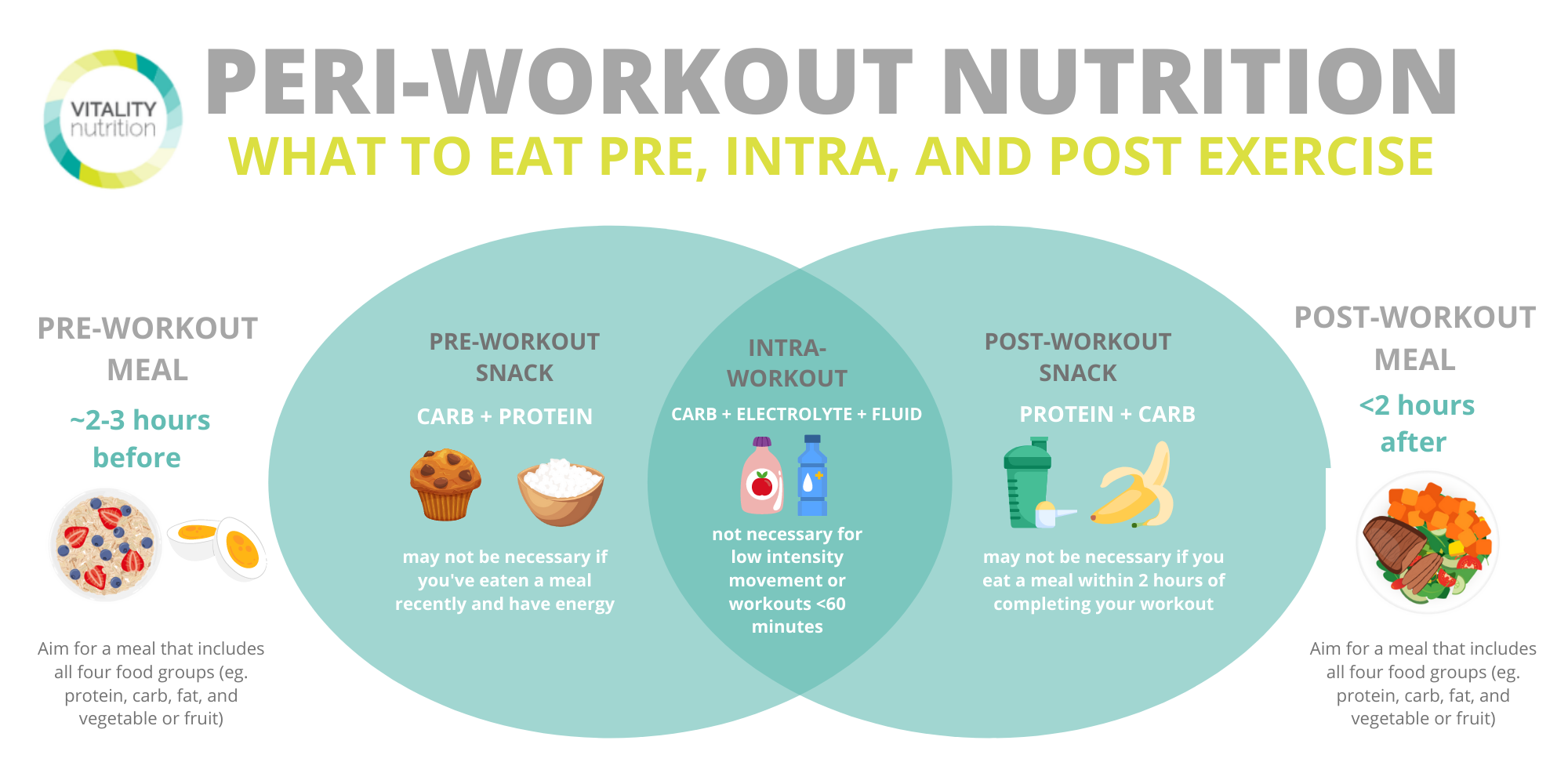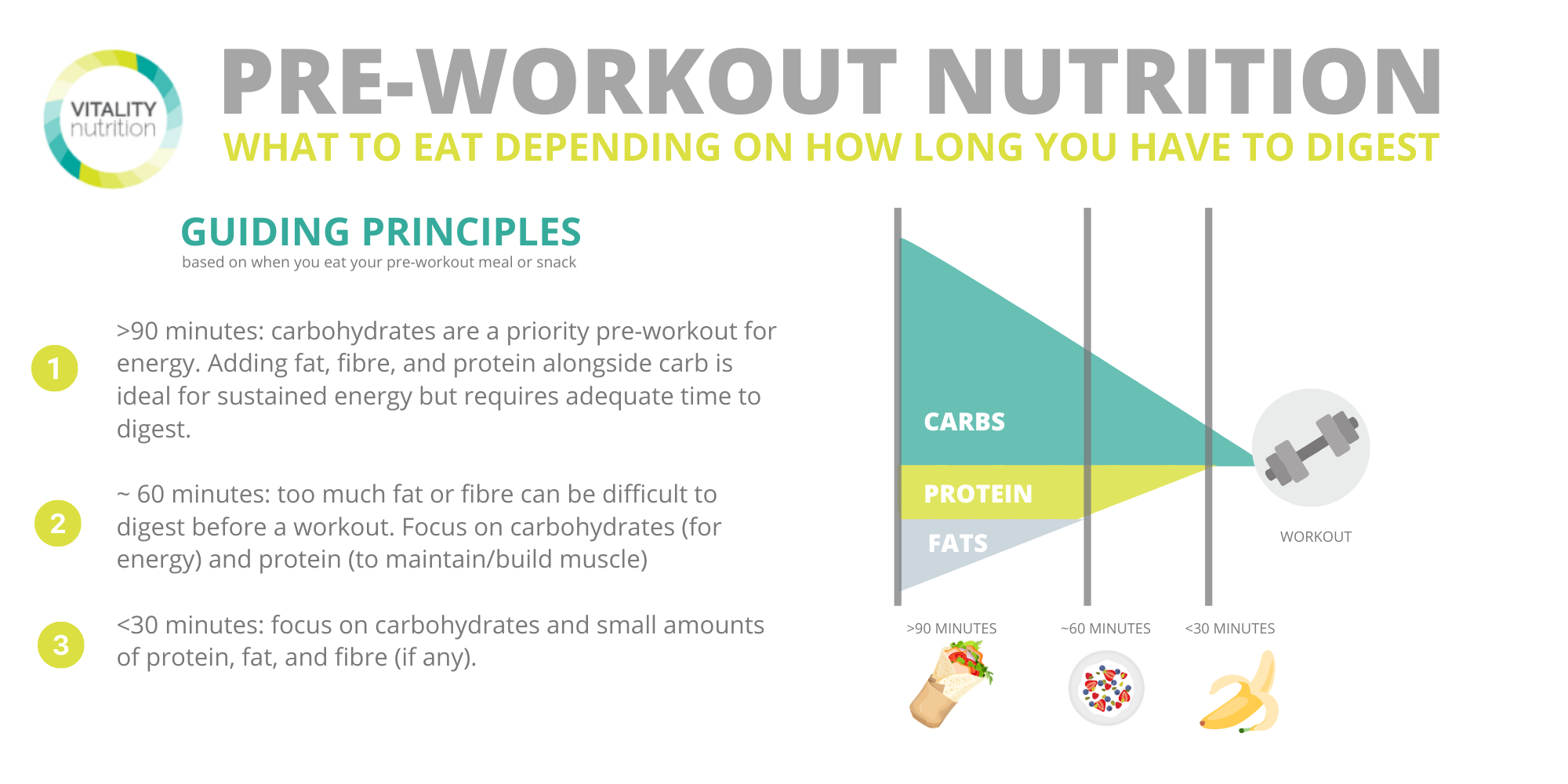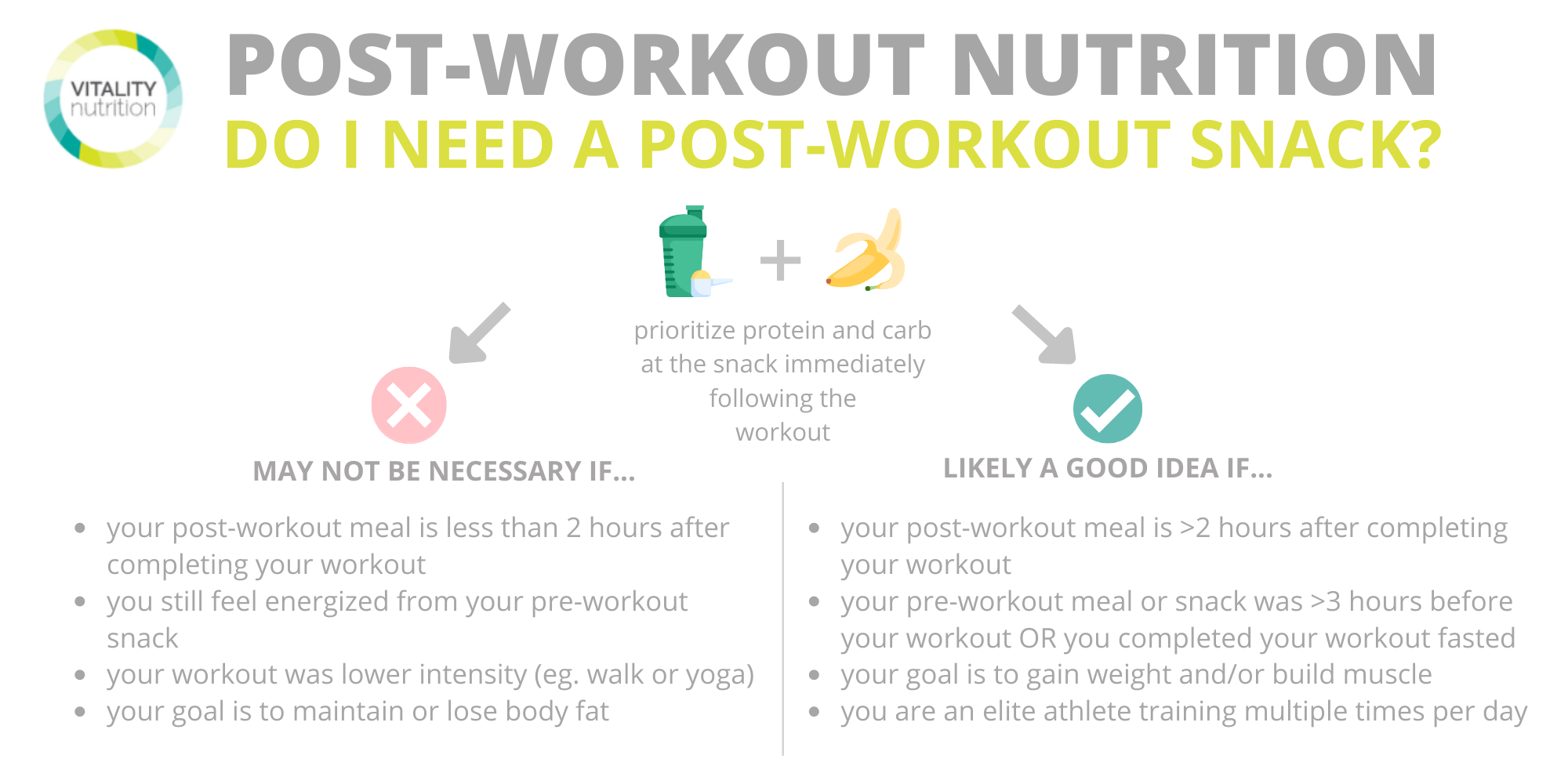What To Eat Before, During, & After A Workout │ Your Guide To Peri-Workout Nutrition
May 05, 2022
A Registered Dietitian's essential guide to pre-workout, intra-workout, and post-workout nutrition.
Choosing what to eat pre-workout, intra-workout, and post-workout requires an understanding of peri-workout nutrition. Peri-workout nutrition is the science of appropriately timing macronutrients (ie., carbs, protein, and/or fat) before, during, and after a workout for optimal digestion, energy, and muscle recovery!
Whether you are an elite athlete looking to optimize performance or a fitness enthusiast looking to feel your best, understanding what and when to eat surrounding your workouts is essential. In this article and accompanying podcast, the Registered Dietitians at Vitality Nutrition uncover the science of pre-workout, intra-workout, and post-workout nutrition!
** CLICK HERE TO LISTEN TO THE PODCAST EPISODE **
WHAT TO EAT PRE-, INTRA-, AND POST-WORKOUT
Studies show that proper nutrition timing can benefit muscle recovery and growth, athletic potential, and body composition. This means that eating the right foods at the right times can help you accomplish your goals faster! Let’s take a look at the science behind pre, intra, and post-workout nutrition alongside some dietitian-approved sample meals and snacks for each.

1. PRE-WORKOUT NUTRITION
A strategic pre-workout meal provides energy for the workout itself, in addition to potentially creating an anabolic environment that prevents muscle breakdown. As sports nutritionists in Saskatoon, we believe that the pre-workout meal is the most important peri-workout nutrition consideration one can make. This is because what you eat before a workout is ultimately what drives both performance and results!
FIVE CONSIDERATIONS FOR YOUR PRE-WORKOUT MEAL:
1. CARBOHYDRATE: Most people benefit from the inclusion of carbohydrates before a workout, as they provide an immediate source of energy to optimize energy and performance.
2. PROTEIN: A source of protein pre-workout creates an anabolic environment, meaning that your body has access to the amino acids it needs to maintain and build muscle. If you have 30 minutes or more to digest your pre-workout meal, our team of Registered Dietitians strongly encourage including a protein source, as it will be advantageous to your training performance.
3. FIBRE & FAT: Foods that are high in fibre and/or fat are difficult to digest, which in the context of a workout can impair energy and performance, in addition to causing cramping, bloating, or 'stitches'. If you have less than 60 minutes to digest your pre-workout meal, you may benefit from limiting fats and high-fibre food sources pre-workout. Continue reading for more specific advice on timing your pre-workout meal!
4. HYDRATION: Consuming adequate fluids and electrolytes is key to optimizing energy, muscle contraction, and brain function during a workout. Hydration is particularly important if you have a high sweat rate or workout in a hot/humid climate where your fluid losses are increased. Our Registered Dietitians recommend drinking plenty of water and consuming electrolytes (particularly sodium!) prior to your workout, as doing so will maintain fluid balance, optimize energy, and prevent cramping!
5. TIMING: One of the most important considerations for pre-workout nutrition is building your meal with consideration for the length of time you have to digest it before the workout itself. The timing of your pre-workout nutrition is dependent on your schedule, how digested you like to be before a workout, and the timing of your last meal. Let's consider three scenarios:
A) 30 minutes before your workout:
Let’s say you are 30 minutes out from your workout and realize you haven’t eaten for a long time or are noticing you are hungry and your energy is dropping. With only 30 minutes until your workout you will not have adequate time to digest a meal that is rich in protein, fat, or fibre. To optimize digestion and energy, our Registered Dietitians recommend choosing a low- to moderate-fibre carbohydrate source as your pre-workout snack. Example: A moderate fibre-containing fruit like a banana, a fruit squeeze, 1-2 rice cakes, 1-2 dried dates or mango, or a low-fat muffin. In some cases, athletes prefer quick-digesting liquid calories like juice, coconut water, or Gatorade.
B) 60 minutes before your workout:
If you decide to consume your pre-workout meal or snack 60 minutes before your workout you will have more time to digest and may therefore benefit from adding a source of protein alongside your carbohydrate! Building protein into your pre-workout snack provides amino acids that maximize muscle protein synthesis and prevent your body from breaking down muscle during the workout. Furthermore, a source of protein in your pre-workout snack will slow the breakdown of your carbohydrate source, promoting more stable blood glucose and longer-lasting energy! Some people may benefit from adding fibre and fat to this pre-workout snack to further delay the breakdown and absorption of carbohydrate and to prevent energy dips while training! Examples: When our Registered Dietitians have 60 minutes before a workout, they love to enjoy homemade granola with Greek yogurt, an Oatmeal Gold bar, an egg white omelette with toast, or oatmeal with protein powder mixed in. If you tolerate additional fat and fibre 60 minutes before your workout, you may consider adding a sprinkle of nuts or seeds to your yogurt bowl, whole eggs or cheese to your omelette, or peanut butter to your oatmeal!
C) >90 minutes before your workout:
If you have 90 minutes or longer to digest your pre-workout meal or snack then you would benefit from a mixed meal that includes all four food groups. The Registered Dietitians at Vitality Nutrition always teach clients about the 'Fundamental Four' which includes carbs, fat, protein, and 'volume' (eg. non-starchy vegetables or berries!). The fat, fibre, and protein sources will all have adequate time to digest before your workout, ensuring you don't feel 'heavy' or experience cramping. Furthermore, a meal that pairs carbohydrates with fat, protein, and fibre lends to stable blood sugars (ie., sustained energy). Examples: A breakfast before a mid-morning workout could include eggs mixed with egg whites and vegetables with avocado toast on the side. Lunch before a mid-afternoon workout could consist of a burrito bowl with brown rice and black beans, grilled chicken, cheese or guacamole, sautéd peppers and onions, and a fresh salsa!

What about training fasted?
Some people choose to workout fasted because they enjoy exercising on an empty stomach, or in some cases because they don’t feel hungry before an early morning workout. In our experience as Registered Dietitians, we've even had clients share that they've read that fasting before a workout was the best way to lose body fat. Like most considerations in nutrition, what works best for you will be individualized. However, when it comes to training fasted we would like to offer a few important, science-based considerations:
- Eating before a workout can help you reach your goals. Optimizing your energy for the workout is ultimately what will help you build muscle, improve fitness, and/or decrease body fat. So while skipping meals may yield a caloric deficit that could facilitate fat loss, it may not be an effective strategy if it compromises the energy you bring to your training sessions.
- Eating before your workout (particularly carbs) is an important consideration for optimizing performance. Carbohydrate are an immediate energy source for higher-intensity training sessions like running, CrossFit, powerlifting, or bodybuilding style workouts. If your workout is lower intensity in nature – such as light jogging, walking, or yoga – pre-workout fuelling may not be as imperative.
- Fasting contributes to low energy availability which can cause menstrual cycle disturbances. As Registered Dietitians, we would not recommend fasting prior to exercise for women looking to support fertility, restore their menstrual cycle, improve symptoms across their menstrual cycle, or optimize athletic performance. In athletes, inadequate levels of female hormones (eg., estrogen and progesterone) are shown to have a negative impact bone mineral density, muscle protein synthesis, and athletic performance. Furthermore, an imbalance in female hormones can impair fertility, mood, energy, and cardiovascular health.
- If you train fasted then your post-workout meal becomes even more crucial. Because there is no carbohydrate or protein supplied from a pre-workout meal, liver glycogen and amino acids will be more quickly depleted. Eating immediately post-workout is therefore critical in order to optimize recovery and prevent muscle breakdown.
2. INTRA-WORKOUT
Eating and drinking during a workout is not recommended for everyone - especially if you have a well balanced and well timed pre-workout meal. While most fitness enthusiasts do not require intra-workout nutrition, there are some scenarios where eating or drinking may be beneficial:
- People who do steady-state workouts at a moderate to high intensity for 60-90 minutes or longer (eg., long-distance runners, cyclists, or people completing longer resistance training sessions). In this case, consuming an easy-to-digest source of carbohydrate, fluids, and electrolytes may be ideal. Some athletes prefer liquid sources like Gatorade or Skratch which contain carbohydrate, fluids, and electrolytes all in one! Other athletes prefer solid food sources like dried fruit, low-sugar cookies, low-fibre fruits, or fruit pouches alongside an electrolytes solution (eg. water and a Nuun tablet). We generally recommend that athletes start with about 30g of carbohydrate, 500mg of sodium, and 500mL or more of fluid per hour of steady-state, high-intensity exercise.
- Elite athletes looking to optimize performance during their training sessions or competitions. Consuming carbohydrates provides a source of energy to the brain and muscles that can help to optimize decision-making and delay time to fatigue.
- People who train fasted. People who workout without eating in the morning after an overnight fast may benefit from consuming an essential amino acid (EAA) supplement to prevent muscle breakdown. In some cases, a small amount of carbohydrates may be beneficial to maintain blood glucose levels for moderate- to high-intensity training sessions.
- People working out in hot and humid climates. Because fluid and electrolytes losses increase in the heat, a supplementary intra-workout source of fluid and electrolytes may be beneficial to maintain hydration balance and prevent fatigue. In cases like this, our Registered Dietitians recommend mixing 500mL of water with a Nuun tablet, to be consumed during a work-out.

3. POST-WORKOUT NUTRITION
When people think about peri-workout nutrition, images of chugging back a post-workout protein shake immediately after training often come to mind! While eating post-workout is important for recovery, it isn't as urgent as it was once thought to be, and certainly doesn't require drinking a protein shake (unless of course you enjoy consuming protein in that form). Let’s review some key considerations for optimizing the post-workout nutrition window:
1. PROTEIN: An important nutrient in the post-workout meal is a complete protein source that provides amino acids to stimulate muscle protein synthesis and spark the recovery process. The amount of protein you need to consume post-workout depends on your body weight, but is often within the range of 20-40g. For example, 3-5 ounces of meat, fish, chicken, or tofu, 1-2 eggs with ½ cup of egg whites, a scoop of protein powder in a shake, or 3/4 to 1 cup of plain Greek yogurt or cottage cheese would all achieve the recommended amount.
2. CARBOHYDRATES: Another objective of post-workout nutrition is the replenishment of blood glucose levels and glycogen stores through the consumption of carbohydrate. The recommended amount of post-workout carbohydrate depends on the intensity and duration of the session. For most fitness enthusiasts, our Registered Dietitians recommend choosing low glycemic carb sources (eg., higher fibre and minimally processed carbs) that keep blood sugars steady after a workout. However, elite athletes who train multiple times a day may benefit from prioritizing fast-digesting, high glycemic carbs (eg., white starches and tropical fruits) that more readily replenish glycogen.
3. TIMING: While research outcomes are mixed when it comes to the urgency of a protein-containing post-workout meal or snack, our Registered Dietitians typically recommend that clients consume a meal within two hours of completing a work-out. In addition to providing amino acids to maintain and build muscle, eating a post-workout meal or snack helps to maintain blood sugar levels and prevents you from feeling 'too hungry' - leading to overeating or unsupportive nutrition choices later in the day. If you aren't able to eat a meal within two hours of your workout, you may benefit from a post-workout snack (eg., a protein shake and a banana) to support your energy and recovery until you can get home to consume a balanced, protein-containing meal.
4. FATS/FIBRE: Unlike our recommendations for pre-workout nutrition, our Registered Dietitians do not recommend limiting fats or fibre in the post-workout meal. Since the workout is already complete, limiting slow digesting foods is not necessary to prevent cramping or to optimize energy availability. While elite athletes may benefit from limiting fats and fibre post-workout to maximize carbohydrate absorption, most fitness enthusiasts will benefit from the inclusion of a moderate amount of fat and fibre in the post-workout meal. These foods will provide added nutrition and can help keep blood sugars stable post-workout!
5. ANTIOXIDANTS. While we've mostly focused on key macronutrients in the post-workout meal, consuming antioxidants in the form of colourful fruits and vegetables can speed-up tissue repair and recovery times by reducing oxidative stress. Dietitian tip: Try adding some colour to your post-workout meal by blending berries into a smoothie, or by infusing vegetables into a post-workout omelette, power bowl, or sandwich!

ADDITIONAL CONSIDERATIONS
Understanding how to fuel your body around your workouts is key to optimizing energy, performance, and recovery. However, additional factors are also relevant in reaching your fitness and performance goals:
- What you eat across the entire day impacts recovery. What you eat around your workout is only a percentage of your daily nutrition needs. Ingesting adequate calories and protein catered to your specific goals (eg., muscle gain, weight loss, or body recomposition) across the entire day is key to facilitating muscle growth and recovery.
- Recovery requires micronutrients, too! While we did not discuss the role of vitamins and minerals in optimizing recovery and performance, consuming a diet rich in whole foods from all four food groups is a key consideration in the prevention of micronutrient deficiencies that can delay your progress.
- Lifestyle factors like sleep quality impact recovery. Obtaining adequate sleep is a key consideration when looking to maximize the body's ability to recover and build muscle.
- The workout is what drives progress. Progressively challenging yourself in your training is what applies ‘good stress’ to the body, and ultimately drives your results. You can perfectly design a peri-workout nutrition strategy but if you aren’t pushing yourself to progress in each training session, your body won't be stimulated to adapt and become fitter, faster, or stronger! You can learn more about this concept of progressive overload in our podcast on body recomposition (here) and article (here).
BOTTOM-LINE
Peri-workout nutrition is all about giving your body fuel around your workouts to maximize energy and make the most of your training! Key take-aways the Registered Dietitians at Vitality Nutrition would like their clients to remember include:
- It’s important to experiment with what works best for you and to consult with a Registered Dietitian who specializes in sports nutrition for additional support and guidance.
- The pre-workout meal ideally contains a source of carbohydrate and may include protein to optimize muscle protein synthesis. Fat and fibre sources may be appropriate in pre-workout meals or snacks, so long as there is enough time to digest them before your workout.
- Intra-workout nutrition isn’t recommended for most people, but may be beneficial if you train at a high intensity for longer than 60-90 minutes. In this case, fluids, carbohydrate, and/or electrolytes may enhance performance.
- As a general principle, it is recommended to consume a meal at least two hours after a workout. Carbohydrate and protein should be the priority in a post-workout meal, but fat and fibre can also be included.
If you enjoyed this article and accompanying Podcast episode you can support us in continuing to provide free content by sharing this information with your training buddy or anyone you feel could benefit from learning more about how to fuel their body for their workouts!
Ready to bring the evidence-based nutrition support of our Registered Dietitians into your kitchen?
Hungry for more?
Get recipes, tips, and updates from the Vitality Nutrition team straight to your inbox!
Don't worry, your information won't be shared.

